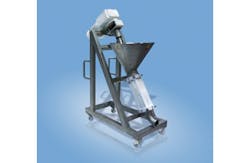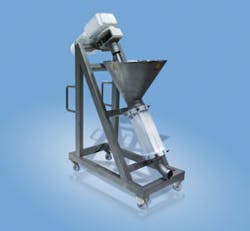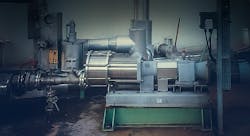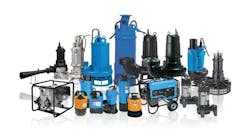With global markets for processed-meat expected to grow by nearly 6% annually for the next half-decade, poultry demand will drive process-equipment markets.
Pumps that are used to move solids play an important role in processed-meat preparation.
One good option in this regard is use of vertically mounted, open-hopper progressive-cavity pumps with something the maker calls "smart-stator technology" (SST) to process boneless, chunked or ground meat, as well as soups, stew or chili — without product damage.
Other meat-handling pumps include air-driven diaphragm pumps or lobe pumps. These pumps have higher energy and maintenance costs than do progressive-cavity pumps, and more often damage product.
Conveyors are also used to move solids, but this involves the highest energy use and is an unsanitary food-handling method, open to the air and requiring intense cleaning efforts.
A case in point
Recently, a well-known food company that specializes in developing custom, proprietary culinary creations for restaurant and food-industry brands assisted one of its clients, an organic produce and natural foods store, to find the best way to process organic, hormone and antibiotic-free chicken without damage, all within the client’s processing facility.
On-site laboratories do systematic product testing to ensure ingredients are inspected and monitored at critical process-control points, whether procurement and production or packaging and distribution. Classically trained culinary and technical research-and-development professionals conduct the testing. Successful testing is supported by the close cooperation of the "operations" and "quality" teams, working to ensure safely handled, high-quality food products.
The food company worked with Statco Engineering, Huntington Beach, Calif., a company recognized as one the largest process-equipment distributors and systems integrators for the sanitary-processing market in North America. It was through Statco Engineering that seepex, the pump manufacturer, offered to demonstrate what it believes is a real food-industry innovation, the BCSO 70-6LS vertical cone hopper, progressive-cavity pump with smart-stator technology (SST).
Preliminary results
Using chicken breasts that were not marinated but that were slightly frosty, the pump passed the chicken, but macerated slightly. The test team concluded that the pump cavity size needed to increase.
As the provider, seepex was able to offer the pump fabricated to the exact dimensions needed and with a performance guarantee to eliminate shear. The using company bought its first seepex pump in May, 2013. The pump was customized for the application with a Viton (HC) elastomer, pieces of which would be detectable by any X-ray machine used to inspect the meat for bone, metal or other foreign fragments.
The pump worked well from the get-go, when it was used to pump kidney-plated chicken breasts through 10 feet of 3-inch diameter hose, during which it passed through an X-ray machine and to a three-way diverter valve.
Further testing verified the elastomer was properly identified by the X-ray machine. A small elastomer sample was placed in the finger of a vinyl glove and inserted into the pipe ahead of the X-ray machine. The machine detected the sample and diverted product to the bypass.
Varied product lines
In July, the team tested running different products through the pump. Sixteen-ounce marinated chicken breasts were pumped with no apparent damage, making them easier to sort on the conveyor belt, reducing handling time. Beef strips were also pumped successfully. A second pump was purchased, and soon after a third came under discussion.
The point is that there are good reasons for looking to progressive-cavity pumps for these type applications. In a progressive-cavity pump, a single external-helix rotor turns within a molded, double internal-helix stator to form progressively moving cavities to create the pumping action. Pump output is directly proportional to drive speed, with conveying capacities up to 572 gpm and pressures to 60 PSI for the specified pumps.
Because its customized stator ensures an identical compression-ratio along the entire length of the rotor/stator interface, less than 1% of goods processed are damaged. The pump handles whole deboned meats without causing shear and while maintaining product integrity.
All wetted pump parts are FDA and 3A-Sanitary Standards compliant and constructed according to EHEDG regulations. Pumping elements are mounted vertically beneath the stainless-steel hopper, saving floor space. Additionally, the SST benefits the entire process and overall productivity of the facility by reducing assembly times by up to 80% compared to standard progressive cavity pumps. The division of the stator into two halves allows easier inspection, maintenance, and cleaning without needing to disassemble pipework.
As a German-based pump manufacturer, seepex says it offers unique technology for handling solids. The seepex progressive-cavity pumps are built at its ISO 9001-certified plant in Enon, Ohio, and the supplier notes that 95% of pump components are fabricated, manufactured or purchased from sources in the United States.
Solutions from seepex include for conveying and controlling a wide variety of low to highly-viscous, and even aggressive or abrasive media. Currently represented in over 50 countries, the company has a dense network of branch offices, agencies and manufacturing bases in the USA, Germany and China. For more than 40 years, seepex has been offering solutions to chemical, environmental, oil and gas, food, paper and numerous other niche markets. Its state-of-the-art modular design system comprised of eight product groups and 27 ranges ensures a solution for even the most extreme application.



